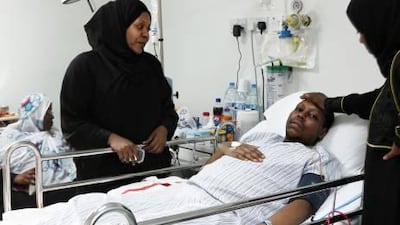DUBAI // A mother's appeal on live radio exposing the plight of her cancer-stricken son has thrust the issue of health care to the top of the national agenda.
Listeners heard the woman from Umm Al Qaiwain describe how Ahmed Khamis Feyrous Mohammed Al Ali's condition was misdiagnosed twice, and after his cancer was identified health officials twice rejected recommendations by doctors that he be sent overseas for treatment.
While the 30-minute broadcast was still on air, Sheikh Hamdan bin Mohammed, Crown Prince of Dubai, offered to pay in full for Mr Al Ali's treatment abroad. And several hours later, Dr Hanif Hassan was dismissed from his post as Minister of Health.
The dramatic events on Tuesday have shone a spotlight on the delivery of health care, particularly in the northern Emirates, and on efforts to persuade patients to seek treatment in the UAE rather than overseas.
Documents made public by the FNC last December indicated that the Ministry of Health's budget was not enough to finance its programmes to fight chronic diseases such as diabetes, to buy medical equipment or to develop and maintain facilities.
The ministry said an outside consultant had recommended a Dh500 million increase in its budget. In June, the cabinet voted for a Dh105m increase.
Last month, a shortage of doctors forced Al Dhaid Hospital in Sharjah to close its doors. Although officials at the hospital declined to comment on why doctors were leaving, an FNC committee made visits to all government hospitals in the Northern Emirates last year and found that chronic staff shortages brought on by low wages had led to substandard treatment. The report also found shortages of medical equipment.
The case of Mr Al Ali came to a head when his mother, Umm Ahmed, called Abdullah bin Khusaif, a presenter on the weekday morning radio show Al Rabeaa Wal Nass, at about 11am on Tuesday.
Umm Ahmed expressed disappointment with the ministry, and said officials had rejected treatment for her 30-year-old son.
During the 30-minute conversation, Mr Khusaif received phone calls from several high-ranking officials, all volunteering to pay for Mr Al Ali's care and treatment abroad.
Umm Ahmed, who is divorced and receives a Dh4,400 monthly pension through social welfare, said when her son first became ill several months ago she took him to a private hospital in Ras Al Khaimah, where he stayed for two days.
Finding treatment there too expensive, she moved him to Dubai Hospital. After a series of tests, doctors said Mr Al Ali was HIV-positive. He was readmitted to hospital two months later, and Dubai Hospital doctors sent him to Rashid Hospital, where the diagnosis was again HIV.
Two weeks later he was readmitted to hospital, and doctors said he had a pulmonary inflammation. Further analysis revealed that Mr Al Ali did not have HIV, but lymphoma, a cancer in the lymphatic cells of the immune system.
Misdiagnosis of her son's condition, coupled with wrongly prescribed medication, only exacerbated his illness, Umm Ahmed said.
"Sometimes he couldn't see or move," she said. "Other times he wouldn't be able to eat or he'd throw up. It was terrible."
Doctors recommended that Mr Al Ali be sent abroad for treatment, Umm Ahmed said, and she received a report from Rashid Hospital.
The ministry rejected the report. Instead, it told Umm Ahmed to take Mr Al Ali to Tawam Hospital in Al Ain.
"They told me I had to do the tests all over again," she said.
After doing some research, Umm Ahmed decided to take her son to Bangkok for treatment.
"But the doctors at Rashid Hospital told me that treatment there wouldn't be sufficient," she said. "So I took a second report to the ministry, and once again it was rejected."
Her other sons tried approaching senior officials at the ministry for help, she said, but they were consistently turned down.
"It was a matter of pure obstinacy," she said.
When Umm Ahmed called the radio programme, she did not expect anything other than a forum to vent her frustration. When she was told that Sheikh Hamdan would cover all expenses, Umm Ahmed was in awe.
"I have no words to express my gratitude or how I feel," she said.
The paperwork is currently being completed to enable Mr Al Ali to receive treatment in Germany.
Asked if she believed her call to the radio station had anything to do with the decree issued by Sheikh Mohammed bin Rashid, Vice President of the UAE and ruler of Dubai, relieving the health minister of his duties, Umm Ahmed said she had no doubt.
"Well yes," she said. "I'm not going to say that it is the only reason, but yes - Sheikh Mohammed heard me and acted upon it. May God bless them all."
The Ministry of Health declined to comment on the case, first reports of which appeared yesterday in the Arabic newspaper Emarat Al Youm.
A spokesman at Rashid Hospital said the hospital was unable to comment as it needed more time to investigate the case.

